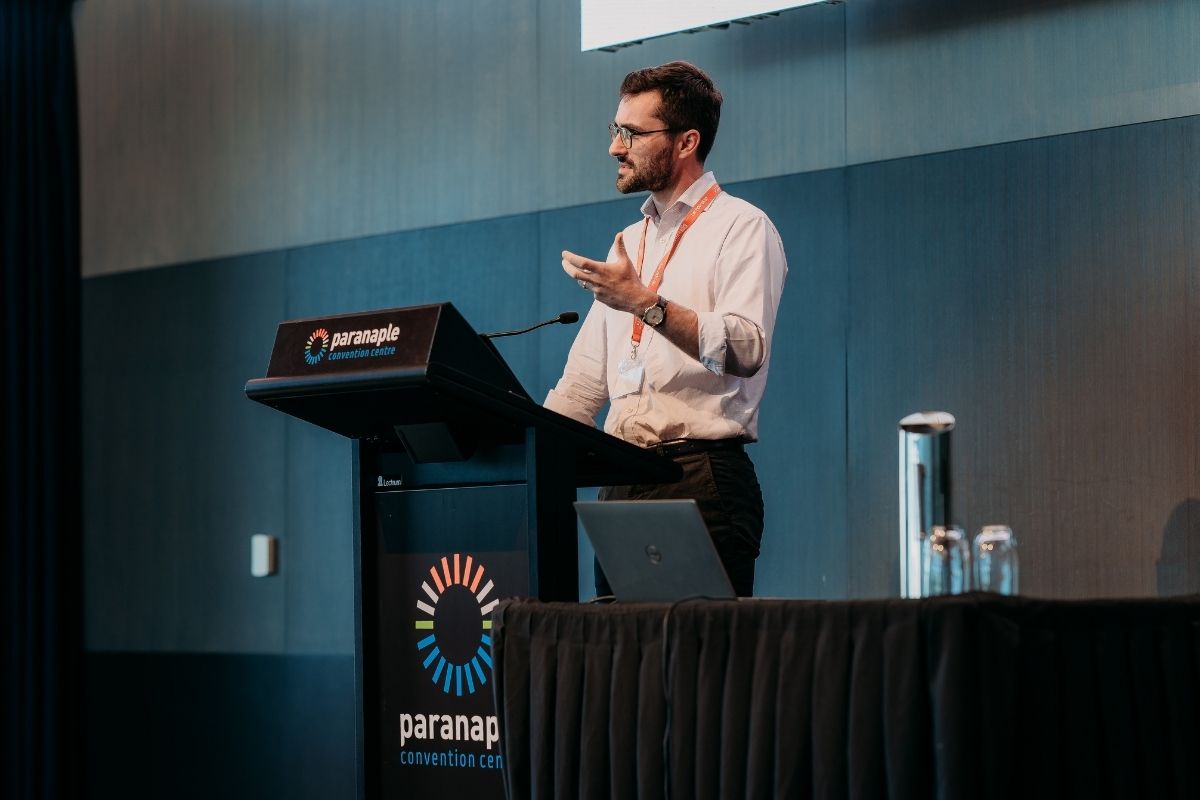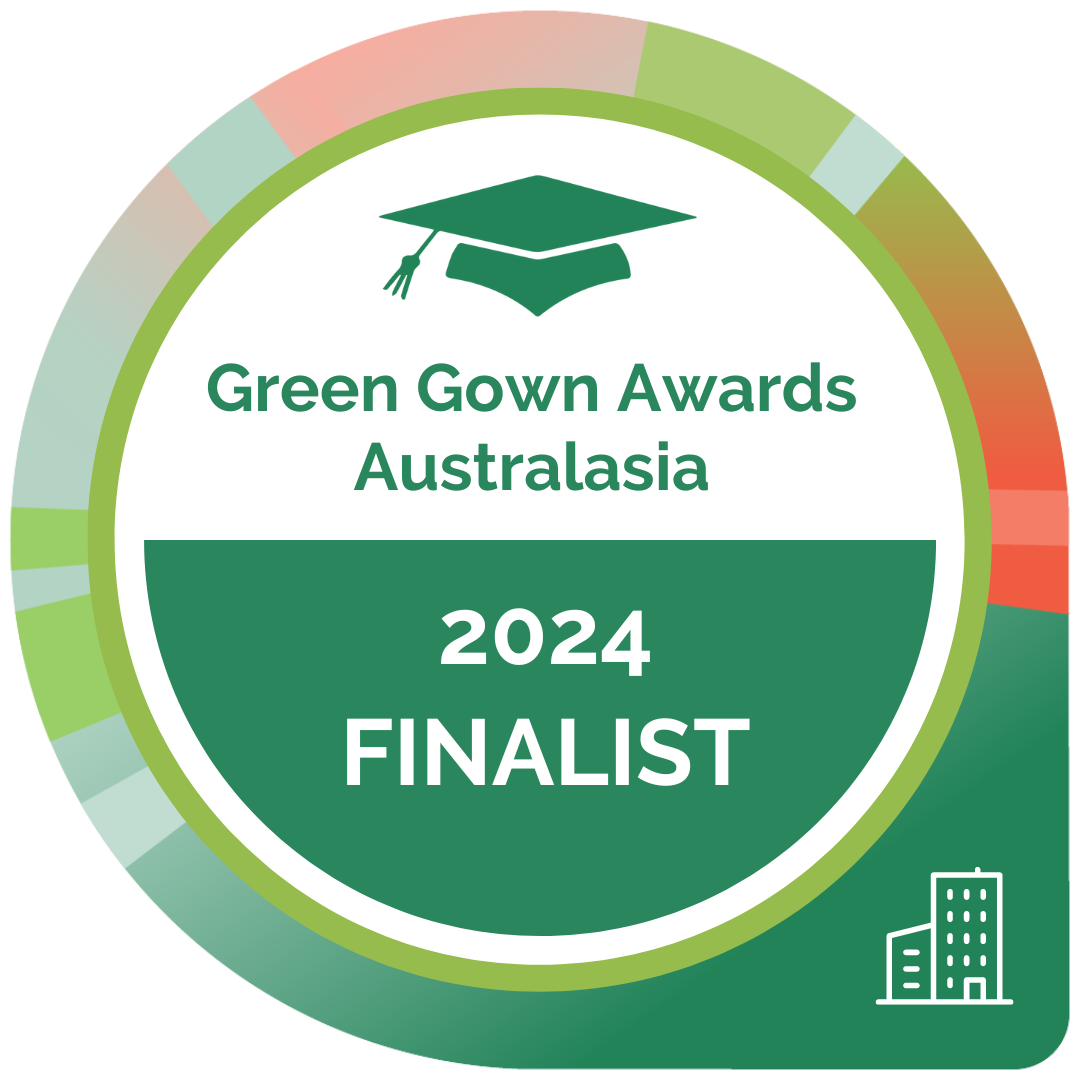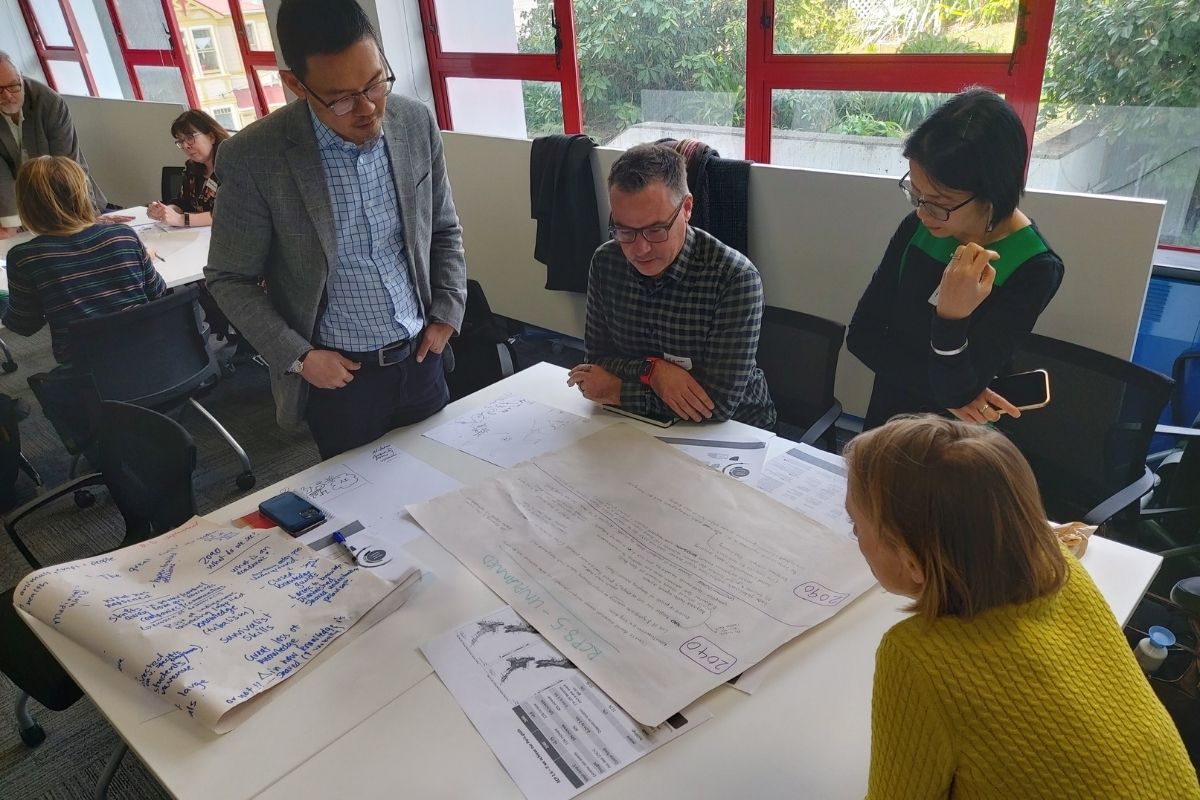Powerful Partnerships category
The University of Tasmania (UTAS) established the “Tasmanian Policy Exchange (TPE)” in 2020 as a strategic initiative aimed at leveraging the university’s research and academic expertise to address critical policy challenges in Tasmania. The TPE operates as a bridge between academia and the wider community, including government, industry, and non-profit organisations, to develop evidence-based policy solutions that contribute to an environmentally, economically, and socially sustainable future for Tasmania. The TPE’s collaborative approach is grounded in place-based research and a focus on long-term societal impact, making it a unique model of university-community partnership.

Environmental and Social Benefits
- Policy Impact on Sustainability: The TPE has contributed to numerous projects with significant environmental and social outcomes, including the development of Tasmania’s Renewable Energy Action Plan and Climate Action Plan. These efforts support Tasmania’s transition to a low-carbon economy and enhance the state’s resilience to climate change.
- Community Engagement: Through its projects, the TPE engages with a wide range of stakeholders, including local communities, government agencies, and industry leaders. This engagement ensures that policy solutions are informed by diverse perspectives and address the needs of all Tasmanians.
- Capacity Building: The TPE supports capacity building within UTAS and the broader community by providing opportunities for staff, students, and local stakeholders to engage in policy development and implementation, fostering a culture of evidence-based decision-making.
Leadership and Engagement
- Collaborative Partnerships: The TPE’s success is built on strong partnerships with government, industry, and community organisations. These partnerships are characterised by active collaboration, where each partner contributes expertise and resources to achieve shared objectives. The TPE’s work with the Tasmanian Government on COVID-19 response strategies and renewable energy planning exemplifies the impact of these collaborations.
- In-House Expertise: The TPE leverages the expertise of UTAS researchers and practitioners, who are integrated into project teams based on their specific knowledge and skills. This approach ensures that the TPE’s work is grounded in the latest research and tailored to the unique challenges of Tasmania.
- Student Involvement: The TPE provides valuable learning opportunities for UTAS students through internships and research projects. These experiences equip students with practical skills in policy analysis and community engagement, preparing them for future careers in public policy and sustainability.
Significance to the Sector
- Innovative Model: The TPE’s place-based, outcomes-focused approach to policy engagement is a distinctive model within the higher education sector. By directly addressing local challenges with global relevance, the TPE demonstrates how universities can play a pivotal role in shaping public policy and driving societal change.
- Replicability: The TPE’s model is replicable across other regions and institutions, offering a framework for universities to engage meaningfully with their local communities while contributing to global sustainability goals. The TPE’s success in Tasmania serves as a case study for how universities can bridge the gap between research and policy.
- Sector Leadership: The TPE positions UTAS as a leader in university-community partnerships, particularly in the areas of sustainability and public policy. The TPE’s work has gained national recognition and influenced policy discussions beyond Tasmania, highlighting the potential for broader impact.
Wider Societal Impact
- Policy Influence: The TPE’s work has led to significant policy changes in Tasmania, including the passage of the Voluntary Assisted Dying Bill and the development of sectoral emissions targets in the state’s Climate Change Act. These outcomes demonstrate the TPE’s ability to influence public policy in ways that improve the lives of Tasmanians and being globally relevant.
- Economic and Environmental Resilience: By supporting the development of policies that promote renewable energy, sustainable transport, and climate adaptation, the TPE contributes to the long-term resilience of Tasmania’s economy and environment. These efforts help ensure that Tasmania is well-positioned to meet the challenges of a changing climate.
- Community Well-Being: The TPE’s focus on social equity and inclusion ensures that its policy recommendations consider the needs of all Tasmanians, particularly vulnerable populations. This commitment to social justice is reflected in the TPE’s work on child safety, local governance reform, and public health.
The Tasmanian Policy Exchange (TPE) at the University of Tasmania exemplifies the power of university-community partnerships in addressing complex societal challenges. Through its innovative approach to policy engagement, the TPE not only enhances the university’s impact on Tasmania but also sets a new standard for how universities can contribute to sustainable development. The TPE’s work demonstrates that by bringing together academia, government, industry, and the community, it is possible to create meaningful and lasting change that benefits society as a whole.
Top 3 learnings
Supported by

Category finalists
Powerful Partnerships/Winners
Powerful Partnerships/Winners
Past winners
Benefitting Society/Winners
Benefitting Society/Winners
Diversity, Equity & Inclusion in Sustainability/Winners
Diversity, Equity & Inclusion in Sustainability/Winners
Climate Action/Winners
Climate Action/Winners
Sustainability Institution of the Year/Winners
Sustainability Institution of the Year/Winners
Creating Impact/Winners
Creating Impact/Winners
Creating Impact/Winners
Creating Impact/Winners
Top 3 learnings
Powerful Partnerships category
The University of Tasmania (UTAS) established the “Tasmanian Policy Exchange (TPE)” in 2020 as a strategic initiative aimed at leveraging the university’s research and academic expertise to address critical policy challenges in Tasmania. The TPE operates as a bridge between academia and the wider community, including government, industry, and non-profit organisations, to develop evidence-based policy solutions that contribute to an environmentally, economically, and socially sustainable future for Tasmania. The TPE’s collaborative approach is grounded in place-based research and a focus on long-term societal impact, making it a unique model of university-community partnership.

Environmental and Social Benefits
- Policy Impact on Sustainability: The TPE has contributed to numerous projects with significant environmental and social outcomes, including the development of Tasmania’s Renewable Energy Action Plan and Climate Action Plan. These efforts support Tasmania’s transition to a low-carbon economy and enhance the state’s resilience to climate change.
- Community Engagement: Through its projects, the TPE engages with a wide range of stakeholders, including local communities, government agencies, and industry leaders. This engagement ensures that policy solutions are informed by diverse perspectives and address the needs of all Tasmanians.
- Capacity Building: The TPE supports capacity building within UTAS and the broader community by providing opportunities for staff, students, and local stakeholders to engage in policy development and implementation, fostering a culture of evidence-based decision-making.
Leadership and Engagement
- Collaborative Partnerships: The TPE’s success is built on strong partnerships with government, industry, and community organisations. These partnerships are characterised by active collaboration, where each partner contributes expertise and resources to achieve shared objectives. The TPE’s work with the Tasmanian Government on COVID-19 response strategies and renewable energy planning exemplifies the impact of these collaborations.
- In-House Expertise: The TPE leverages the expertise of UTAS researchers and practitioners, who are integrated into project teams based on their specific knowledge and skills. This approach ensures that the TPE’s work is grounded in the latest research and tailored to the unique challenges of Tasmania.
- Student Involvement: The TPE provides valuable learning opportunities for UTAS students through internships and research projects. These experiences equip students with practical skills in policy analysis and community engagement, preparing them for future careers in public policy and sustainability.
Significance to the Sector
- Innovative Model: The TPE’s place-based, outcomes-focused approach to policy engagement is a distinctive model within the higher education sector. By directly addressing local challenges with global relevance, the TPE demonstrates how universities can play a pivotal role in shaping public policy and driving societal change.
- Replicability: The TPE’s model is replicable across other regions and institutions, offering a framework for universities to engage meaningfully with their local communities while contributing to global sustainability goals. The TPE’s success in Tasmania serves as a case study for how universities can bridge the gap between research and policy.
- Sector Leadership: The TPE positions UTAS as a leader in university-community partnerships, particularly in the areas of sustainability and public policy. The TPE’s work has gained national recognition and influenced policy discussions beyond Tasmania, highlighting the potential for broader impact.
Wider Societal Impact
- Policy Influence: The TPE’s work has led to significant policy changes in Tasmania, including the passage of the Voluntary Assisted Dying Bill and the development of sectoral emissions targets in the state’s Climate Change Act. These outcomes demonstrate the TPE’s ability to influence public policy in ways that improve the lives of Tasmanians and being globally relevant.
- Economic and Environmental Resilience: By supporting the development of policies that promote renewable energy, sustainable transport, and climate adaptation, the TPE contributes to the long-term resilience of Tasmania’s economy and environment. These efforts help ensure that Tasmania is well-positioned to meet the challenges of a changing climate.
- Community Well-Being: The TPE’s focus on social equity and inclusion ensures that its policy recommendations consider the needs of all Tasmanians, particularly vulnerable populations. This commitment to social justice is reflected in the TPE’s work on child safety, local governance reform, and public health.
The Tasmanian Policy Exchange (TPE) at the University of Tasmania exemplifies the power of university-community partnerships in addressing complex societal challenges. Through its innovative approach to policy engagement, the TPE not only enhances the university’s impact on Tasmania but also sets a new standard for how universities can contribute to sustainable development. The TPE’s work demonstrates that by bringing together academia, government, industry, and the community, it is possible to create meaningful and lasting change that benefits society as a whole.
Supported by

Related finalists
Powerful Partnerships/Winners
Powerful Partnerships/Winners
Other finalists
Climate Action

Driving Towards Tomorrow’s Campus with Vehicle-to-Grid EV Technology
As part of Flinders University’s drive to innovate and become a leader in climate action, the University launched its Vehicle-to-Grid (V2G) initiative. This involved installing and maintaining 20x V2G and smart chargers for its growing electric vehicle fleet. Leveraging 100% renewable energy generated by ENGIE’s Willogoleche Wind Farm and Flinders University’s solar power systems, this enables the storage of renewable energy in EV batteries to be discharged on campus during peak demand periods. Hence, allows for these EV fleets to operate as a Virtual Power Plant (VPP) to deliver peak demand management and optimization of behind-the-meter generation.
Overall, this initiative demonstrates the reliability and scalability of bi-directional and uni-directional smart-charging systems for EVs in reducing GHG emissions while facilitating teaching, research, and innovation opportunities. Moreover, it exemplifies a sustainable and innovative solution to scale energy storage technology and increase renewables.
Sustainability Champion – Staff/Winners

Brandan Espe
Environmental Officer / Acting Grounds Supervisor
Brandan has brought over 50 federally listed Endangered species of plant into the James Cook University living collection, many of which have never been cultivated and are found in no other collection in the world.
Of these, over half have been sustainably wild collected, inclusive of field and clone data, so they can be used for ongoing conservation, research and teaching, the remaining being sourced from private and partner organisations through favours of service or trades.
He personally funded the project from 2019-2022, until funding was awarded for the program due to its success, with the program now being engrained into the Universities landscapes for ongoing management should he leave JCU, creating a threatened species legacy collection.
The program has now expanded beyond this, with an additional 48 species now funded for further addition, some of which are only known from less than 5 sightings in history.
Student Engagement

Sustainability Leaders creating real impact!
La Trobe created a unique Sustainability Leaders volunteering program to increase engagement with students on campus and empower them to act against waste and promote sustainability. It included the following initiatives:
- Promoting the reusable crockery implementation,
- Increasing knowledge action of other students on campus to diversion comingled recycling and organic waste from landfill.
- Focus on waste audits and data,
- Improved signage through new waste posters for students living on campus.
- Collaboration with Cirka (our cleaning and waste partner) to create a waste wall and;
- Learning all things sustainability (net zero, biodiversity, waste, reusables, engagement)
These initiatives yielded significant results and with a reduction in waste contamination by almost 40% at the residential buildings and engagement with over 80 groups of people for the Reusable Revolution.
Creating Impact

Where knowledge meets habits: Empowering students for a sustainable tomorrow
Our online Sustainability Challenges offer participants an engaging, self-paced learning experience centered around a specific United Nations Sustainable Development Goal (UNSDG). Requiring minimal resourcing and at zero-cost to participants, we’ve created replicable, compact, scalable, and impactful learning opportunities that result in real impact.
The Challenges follow a structured process that moves participants from knowledge gain to simple action to celebration, to establish small but mighty habits relating to waste and carbon emissions. This approach recognises that knowledge alone is often insufficient to drive behaviour change, and that ease of action and celebration are crucial components in creating sustainable habits.
Sustainability Champion – Staff/Winners

Catherine (CeeJay) Donovan
Veterinary nurse – Anaesthesia
From establishing the Massey Vet School Green Team to leading impactful initiatives, my commitment to environmental sustainability has been making waves. With the help of my team, I have accomplished numerous small, yet meaningful actions, including integrating a sustainability lecture for final year vet students and implementing battery recycling alongside rechargeable battery use. Our larger projects encompass the introduction of green waste and soft plastics recycling bins, an energy audit resulting in power-saving measures, and playing a part in a successful rubbish audit. I spearheaded the ‘6 in 6’ campaign, empowering individuals with six simple steps for workplace sustainability. Through the SustainaVet social media pages I help to educate and inspire peers nationwide. As the Massey School of Veterinary Science sustainability champion, I had the privilege of speaking at the annual veterinary conference on sustainability in clinical practice. Currently I’m conducting pioneering research on responsible cat waste disposal. Together, we’re forging a greener future, one initiative at a time.
Sustainability Champion – Student

Louis Walmsley
SDG Coordinator Monash Association of Sustainability, Office Bearer Monash Student Association’s Environmental and Social Justice Department, Masters of Environment and Sustainability Student
Louis is an exceptional student sustainability leader at Monash University. His passion and dedication to sustainability have made a significant impact on the community. Louis’s values revolve around sustainability, which is evident upon meeting him. He actively participates in various sustainability groups, demonstrating his commitment to creating a more environmentally conscious society.
One of Louis’s notable involvements is with Precious Plastic Monash, where he organizes remarkable events and fosters collaboration among like-minded individuals, student groups, and staff. His contributions to the Monash Association of Sustainability have allowed him to conduct valuable research on plastic usage and climate action, resulting in positive changes within the university.
Through his work with the Monash Student Association, Louis has engaged hundreds of students in fun and interactive sustainability initiatives. He took the initiative to organize a sustainability food fair, which was one of the largest sustainability-related events held at Monash post-COVID. This accomplishment is a true testament to Louis’s hard work and creativity.
Louis is an outstanding student leader whose efforts in sustainability have had a lasting impact on Monash University and its community. His inspiring nature resonates with everyone who knows him.











